【TNF Journal】Business’s New Relationship with Disabilities (Part 23)97% Retention: Benesse Group Pioneering Future of Employment of People with Disabilities

Key Points in this Article
- Current high turnover in the employment of people with disabilities. A special-purpose subsidiary of the Benesse Group achieved a 97% retention rate in fiscal 2021.
- The Benesse Group is making efforts, including reviewing work processes and building systems to support individuals, to provide workplaces where people with disabilities can continue working over the long term.
- The Benesse Group shares case studies and know-how regarding its efforts to encourage diverse workers to play active roles, with the aim of nurturing the future employment of people with disabilities.
Reporting: The Nippon Foundation Journal Editing Department
To achieve “well-being” for everyone, Benesse Holdings, Inc. (external link) is targeting a wide range of age groups with its education, nursing care and childcare businesses. The company is also proactive in employing workers with disabilities. The rate of employment of people with disabilities at the Benesse Group as a whole is 2.65% as of March 1, 2022, which is higher than the statutory employment rate in Japan of 2.3%.
At its special-purpose subsidiary* Benesse Business-mate, Inc. (external link), 167 people with disabilities, primarily people with intellectual disabilities, are employed as of April 1, 2022, and the retention rate for these workers is 97% (2021). Many of such employees have worked for the company for years, and 117 of them have been recognized for 10 years of service.
- * A company established to promote the hiring and stable employment of people with disabilities

According to Current Status of Employment of Persons with Disabilities (external link), which was compiled by the Ministry of Health, Labour and Welfare in 2017, retention after one year from the date of employment is about 60% for people with physical or intellectual disabilities and below 50% for people with mental disabilities. Many workplaces that employ workers with disabilities have a high turnover rate. Under these circumstances, why has the Benesse Group been able to achieve high employment and retention rates?
Members of the Nippon Foundation Working Group* interviewed Haruna Okada, Managing Executive Officer and Executive General Manager of ESG and Sustainability of Benesse Holdings, and Hiroyasu Chatani, President of Benesse Business-mate.
- * Members who engage in research and planning at the Nippon Foundation, whose aim is to accelerate the participation of people with disabilities in society
Supporting children with learning difficulties
Okuhira: I am Masako Okuhira from the Nippon Foundation Working Group. Could you tell us about the Benesse Group’s initiatives for diversity and inclusion (D&I)*?
- * Initiatives to create a society where people can play active roles while respecting and recognizing each other’s differences, including in regard to race, gender, age and ability
Ms. Okada: The Benesse Group has been making efforts to empower female employees. Currently, at its major subsidiary, Benesse Corporation, more than 30%* of managerial positions are held by women. Because of that, however, we came to the conclusion that we had done D&I. To rethink D&I, we established the ESG and Sustainability unit in April 2022. Although our rate of employment of people with disabilities has surpassed the statutory employment rate, we will broaden the scope to employ people with more severe disabilities, members of the LGBTQ community and foreign nationals.
- * According to the Survey of Corporate Attitudes towards Promotion of Women (2020) (external link) conducted by Teikoku Data Bank targeting 23,680 companies (valid responses: 11,732) across Japan in 2020, in that year an average of 7.8% of managerial positions (section managers or above) were held by women.
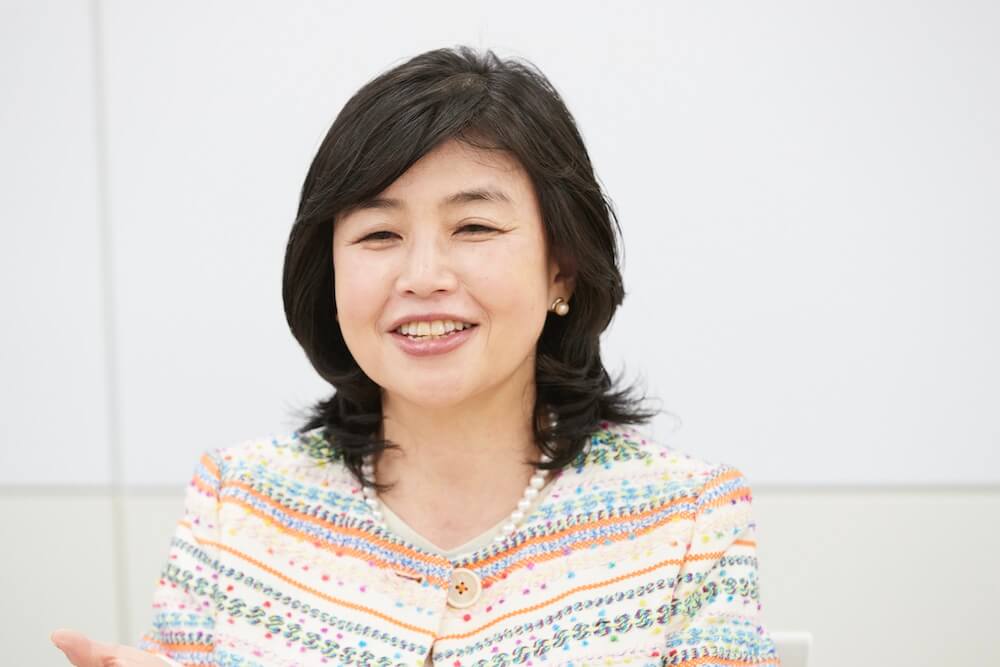
Okuhira: I heard that your group is also focusing on the development of educational contents for children with disabilities.
Ms. Okada: That is right. In the case of correspondence courses provided by Benesse, including the Kodomo Challenge and Shinkenzemi, content materials are delivered to households, where children work on them voluntarily. The number of children who have difficulty studying by themselves due to developmental disabilities or other reasons is not small. Therefore, we started to operate the Developmental Disability Support Site (external link) in 2020 to provide advice to parents of children with developmental disabilities or characteristics associated with developmental disabilities, with the aim of supporting individual children in learning according to their personality or rate of development.
In the meantime, in partnership with Shinagawa City in Tokyo, we are conducting a demonstration experiment for a learning application developed for children with learning disabilities who are not good at reading or writing*.
- * Learning disabilities refers to developmental disabilities that impair a person’s ability to listen, speak, read, write or calculate/reason, despite there being no delay in their intellectual development.
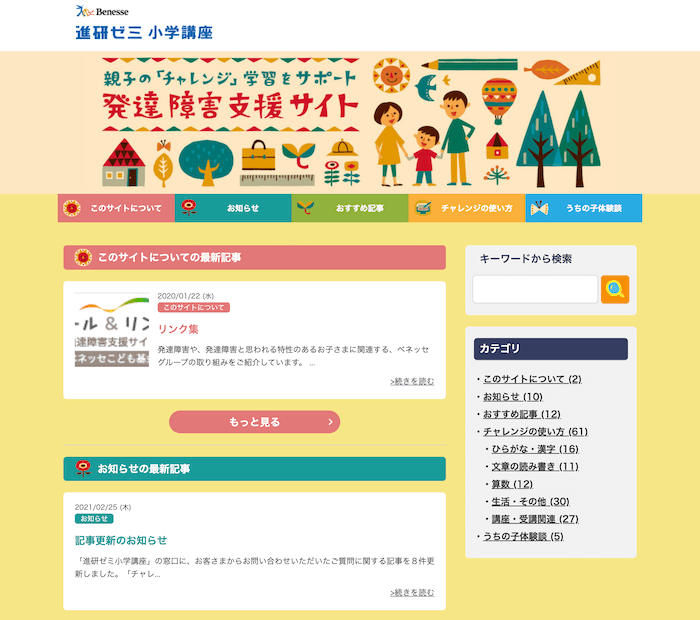
Okuhira: The service seems very helpful for parents of children with developmental disabilities.
Ms. Okada: In terms of children’s academic performance, it is test results that tend to be emphasized. But many children do in fact acquire a lot of knowledge, they just don’t know how to demonstrate it. We hope we can help them, even if only a little.
Okuhira: I think that needs for the service will only grow. In 2021, your group became a member of The Valuable 500 (external link), which is a global business executives’ network organization promoting the inclusion of people with disabilities in business. I heard that an employee of Benesse Business-mate discovered the organization and drove the move to sign up for it.
Mr. Chatani: Exactly. As I had heard about it from an employee, I contacted the headquarters and got the ball rolling to become a member. I have heard that our employees are pleased or proud to see that the Benesse Group’s initiatives for the employment of people with disabilities are expanding on a global scale. They are excited to stimulate the employment of people with disabilities through global cooperation.
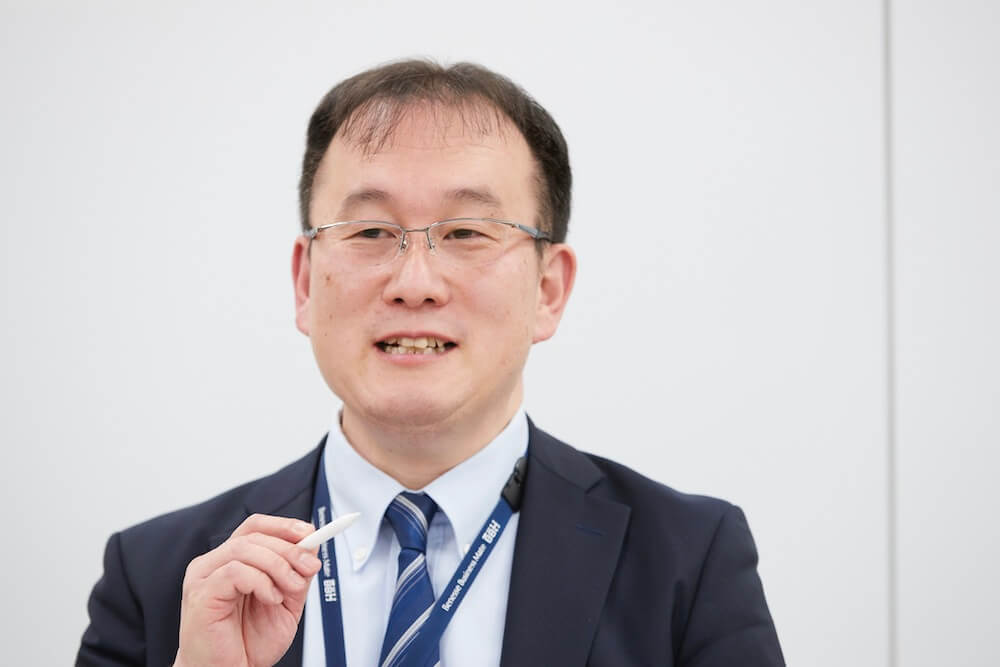
Building a mechanism that allows workers with disabilities to stay in employment for a long time while improving the quality of operations
Okuhira: Could you explain the initiatives undertaken at Benesse Business-mate? What kind of business is the special-purpose subsidiary tasked with?
Mr. Chatani: Benesse Business-mate provides services in the three major areas of operations support, facility services and facility operations as shared services* of the Benesse Group.
- * Shared services refers to consolidating core operations of group companies at one place to improve management efficiency and strengthen the structure of the entire group.
What we do ranges widely from cleaning office buildings that house the Benesse Group to sorting and delivering mail, operating the general affairs desk and providing operational support, such as data processing and entry.
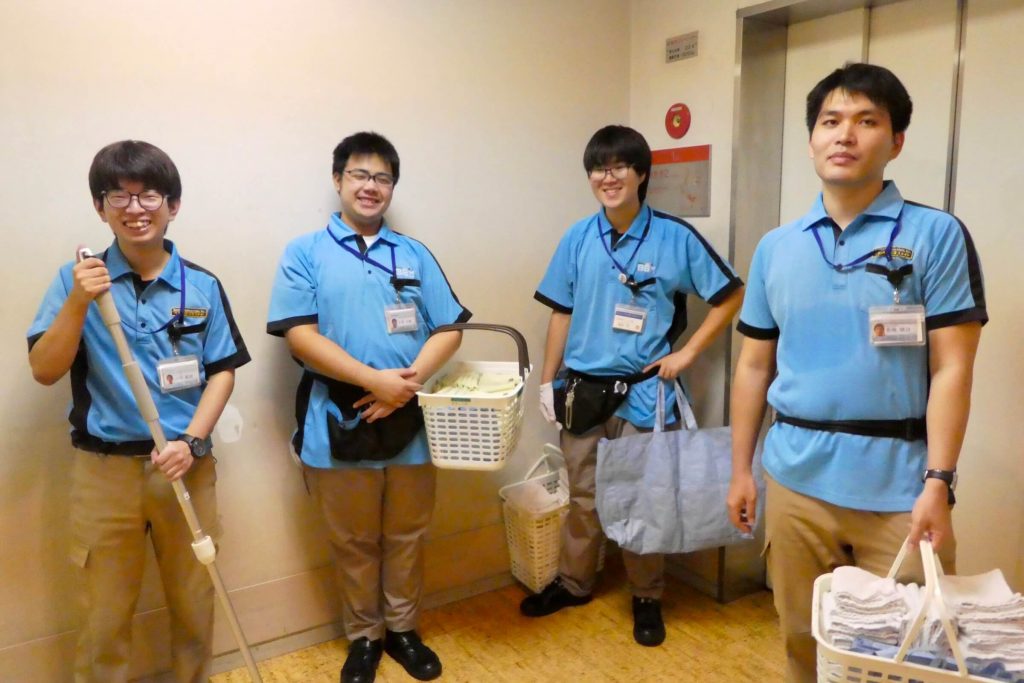
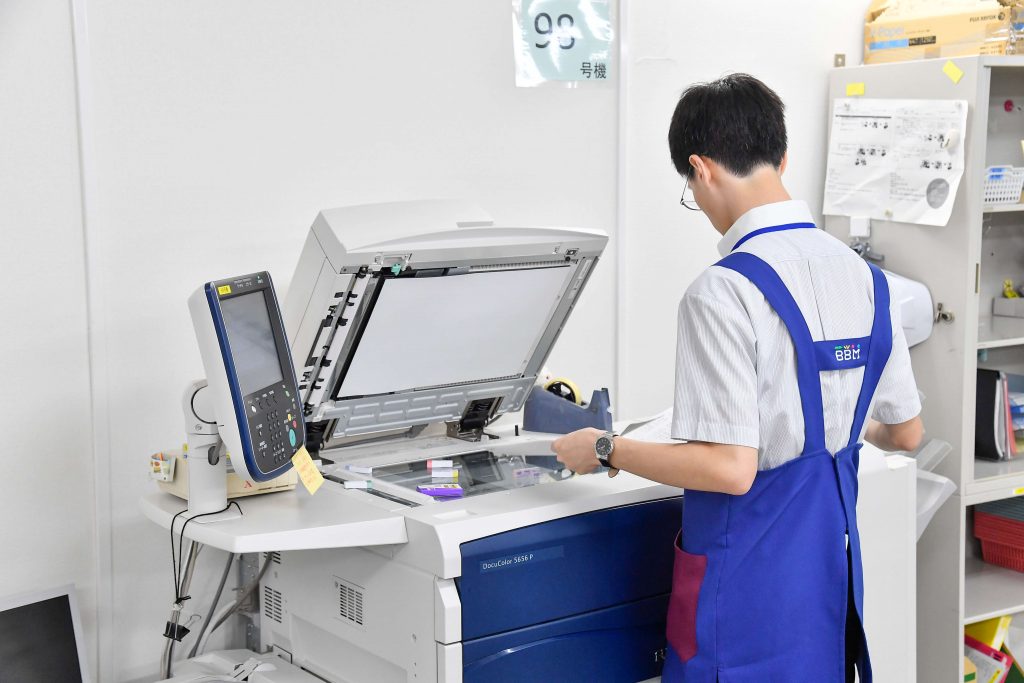
Okuhira: What is the retention rate for your employees?
Mr. Chatani: We are happy to report that ever since our company was established in 2005 the retention rate has been above 80%. It was 98% in fiscal 2020, and 97% in fiscal 2021.
Okuhira: The rates are incredibly high. How do you provide a workplace environment where people with disabilities feel comfortable?
Mr. Chatani: We are focusing on an initiative called “raku job” (literally, “easy job”) that aims to make jobs easy and fun. Under the initiative, we make efforts to review processes and the design of complex and difficult operations and break them down in order to transform them into simple operations that anyone can engage in, so that people with disabilities can undertake a wider range of tasks.
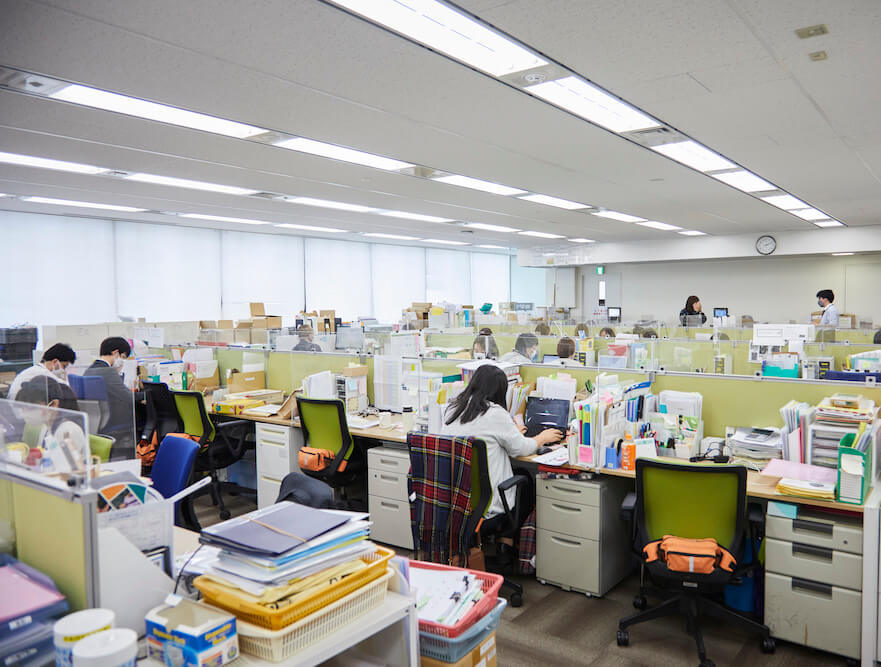
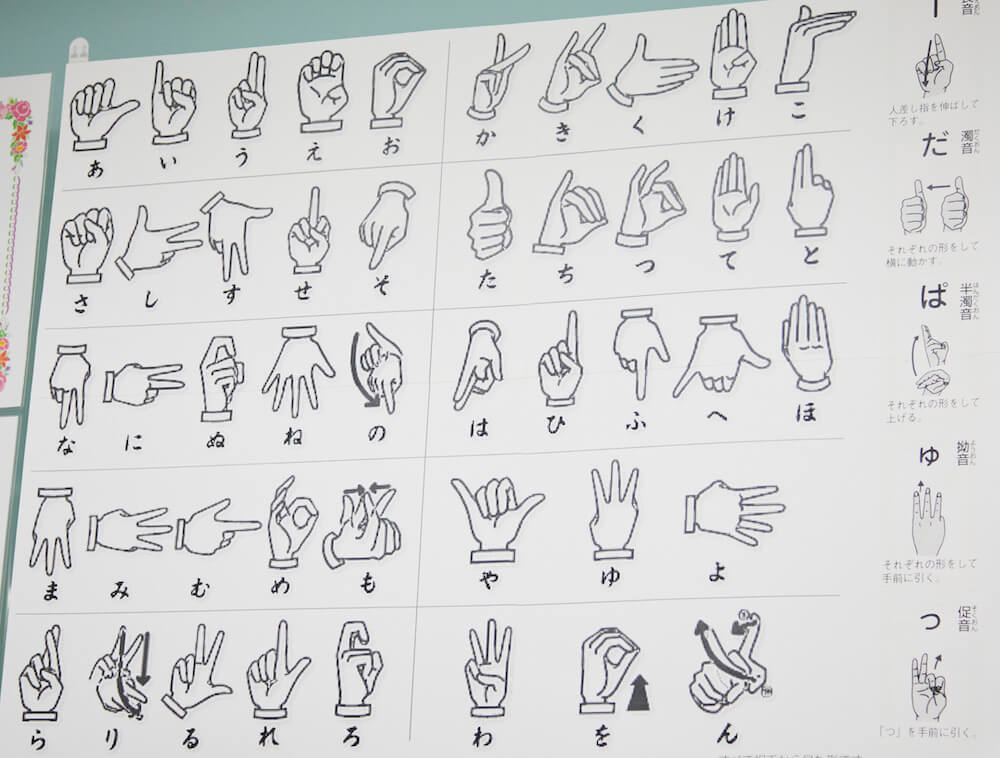
For instance, at the Job Support Center, which supports various operations, an assignment used to be performed by one person from start to finish. Now, an assignment is done on an “effective posting” basis by dividing it into processes in order to allocate tasks according to the characteristics and strength of individual workers. Furthermore, the system has been changed to a team basis, rather than having only one person doing one process, so that even a request received on short notice can be performed with ease.
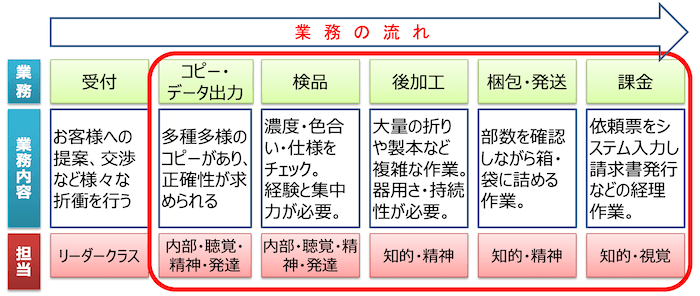
With regard to office building cleaning, we introduced a sanitary control system called “Challenged Housekeeping System,” which is compliant with the guidelines of the US Centers for Disease Control and Prevention (CDC). The method enables anyone, with or without a disability, to perform hospital-grade, high-quality cleaning and sanitary control. We have built a system that allocate tasks according to the strengths and weaknesses of individual employees in order to reduce the physical burden, so that employees can continue to work even if they have moderate to severe disabilities or as they get older.
Okuhira: I see. That is what leads to the high retention rate. Is there anything else you do, for example, in terms of the system, to help them remain on the job?
Mr. Chatani: Yes, there is. We have developed a support system for employees with disabilities and advisers* who support their operations in each department. Additionally, staff from the Retention Promotion Section, which is in charge of providing cross-departmental retention support, offer support through cooperation with workplaces. We not only design and create tasks tailored to individuals but also plan and operate training programs. We also fully liaise with support organizations, such as employment support centers for people with disabilities, and medical institutions, because many employees sometimes feel unwell outside business hours or on holidays. We also work with clinical psychotherapists and provide lots of interview opportunities so that we can become aware of even slight changes affecting employees.
- * Selected from among trained employees with disabilities
With the COVID-19 pandemic, we are making a particular effort to cooperate with families. In the early days of the pandemic, we set a “stay-at-home” period, during which retention support staff and support organizations’ staff stayed in close contact with the families of our employees with disabilities to see how they were and provide advice as needed. Currently, we are distributing a wall newspaper to each household to share how they play an active role. The families really appreciate it.
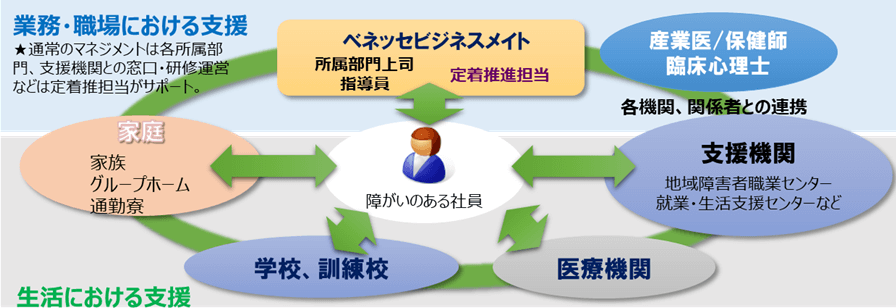
Okuhira: So the support you provide includes something like lifestyle support. It is surprising to see a company extending support to that level.
Mr. Chatani: We are incorporating the know-how of Benesse Socius Co., Ltd. (external link), which was established as a Type A ongoing employment support business* in 2016. We have realized that it is impossible to support individual employees with disabilities without having cooperative relationships with supporting organizations.
- * Support business operator that provides people with disabilities or intractable diseases who have difficulty joining the workforce with employment opportunities and training to improve their employment-related knowledge and abilities. There are two types of business operators: type A, with which an individual concludes an employment agreement, and type B, which allows an individual to work at his/her own pace without concluding an employment agreement.
Okuhira: In providing a pleasant work environment, building relationships with supporting organizations is crucial, isn’t it? The COVID-19 pandemic affected the employment of people with disabilities at many companies. How about Benesse Business-mate?
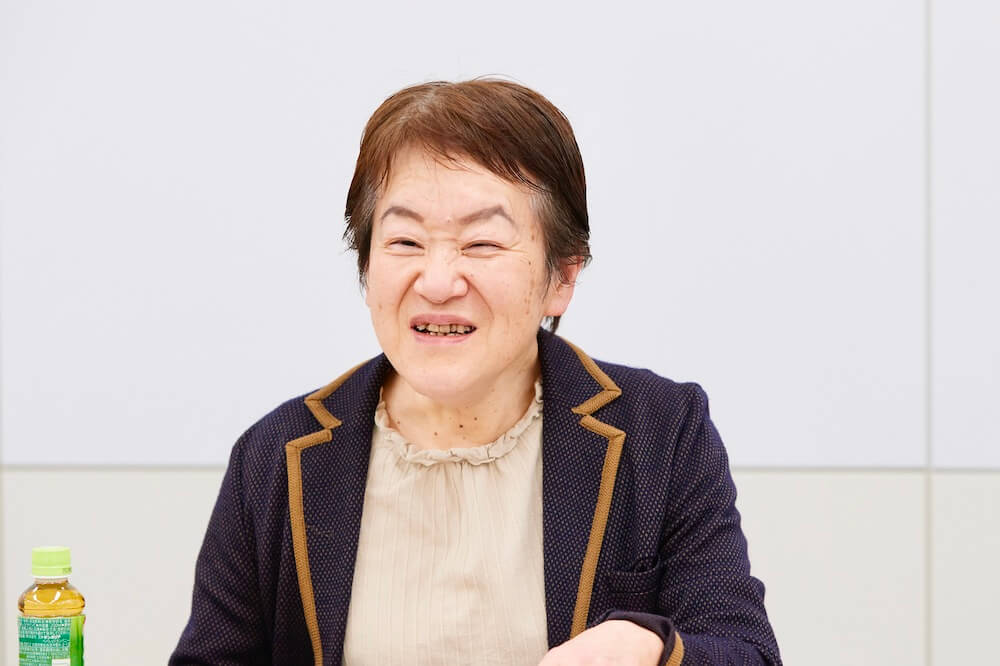
Mr. Chatani: In the last two years, which were affected by the COVID-19 pandemic, remote work increased and the type of work that Benesse Business-mate was entrusted with sharply decreased. Increasing needs for working from home and for tasks using data and digital technologies have made work more difficult. Accordingly, the development of advisers and team leaders who can support employees with disabilities became an issue. We select advisers and team leaders from among our employees with disabilities. Therefore, each department created a skill map for each individual and graded them on 24 items, including basic skills, support skills and operation skills, on a four-point scale to identify the strengths and weaknesses of each individual. Based on the skill maps, interviews were conducted and individual development plans were formulated. And we provided various training programs to provide knowledge as well as the skills and mindset needed for conducting universal operations and digitization.
With these efforts, we have been able to meet work needs arising during the COVID-19 pandemic and stabilize our organization. An organization member with disabilities automated complicated parts of computer operations that Benesse Business-mate has been entrusted with by performing RPA*1 and VBA*2, which has resulted in creating tasks that more and more employees with disabilities can undertake.
- RPA (robotic process automation) refers to the automation of business processes using software robots.
- VBA (visual basic for applications) expands the functionality of application software built into the Microsoft Office suite, allowing a user to write and execute simple programs to automate complicated processing. VBA also refers to a programming language for creating programs.
Okuhira: I think only Benesse as a specialist in education could make such reasonable development efforts.
Disclosing case studies and know-how to develop a society where people with disabilities can take on a wide range of roles
Okuhira: By the way, is there any contact between Benesse Business-mate employees and Benesse Group employees?
Ms. Okada: Before the COVID-19 pandemic, there was daily contact through cleaning offices or delivering mail. As part of their training, new employees of our group had opportunities to experience working at Benesse Business-mate. We received feedback from many new employees saying they were impressed by how professionally employees with disabilities performed their job. Now that remote work is predominant, interactions are decreasing. But we will make efforts to create more opportunities for communication across the group.
Mr. Chatani: For Benesse Business-mate employees, it is very encouraging to hear group employees thanking them.
Okuhira: I was also impressed by the company café operated by Benesse Business-mate, which I have visited on a tour.
Mr. Chatani: That would be Furatto Café, opened in 2021. Currently, four employees with disabilities are serving bagels and hand-dripped coffee. Employees of Benesse Business-mate named the café, hoping that it would be a place where people could casually drop in (which is referred to as “furatto” in Japanese) anytime, and that it would be a kind of hierarchy-free zone, where people could interact without thinking about titles or abilities/disabilities.
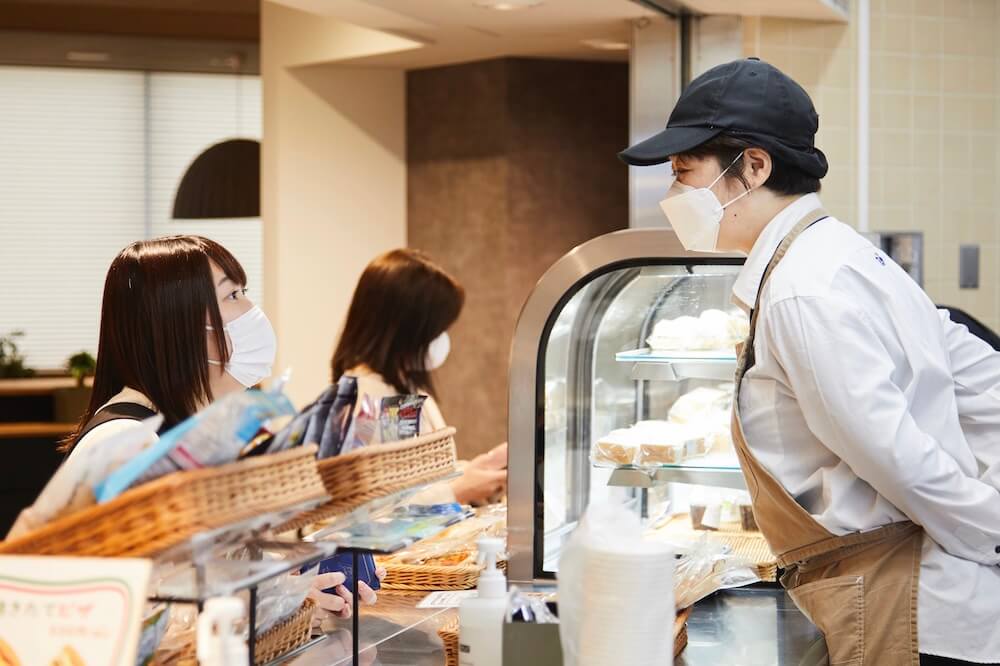
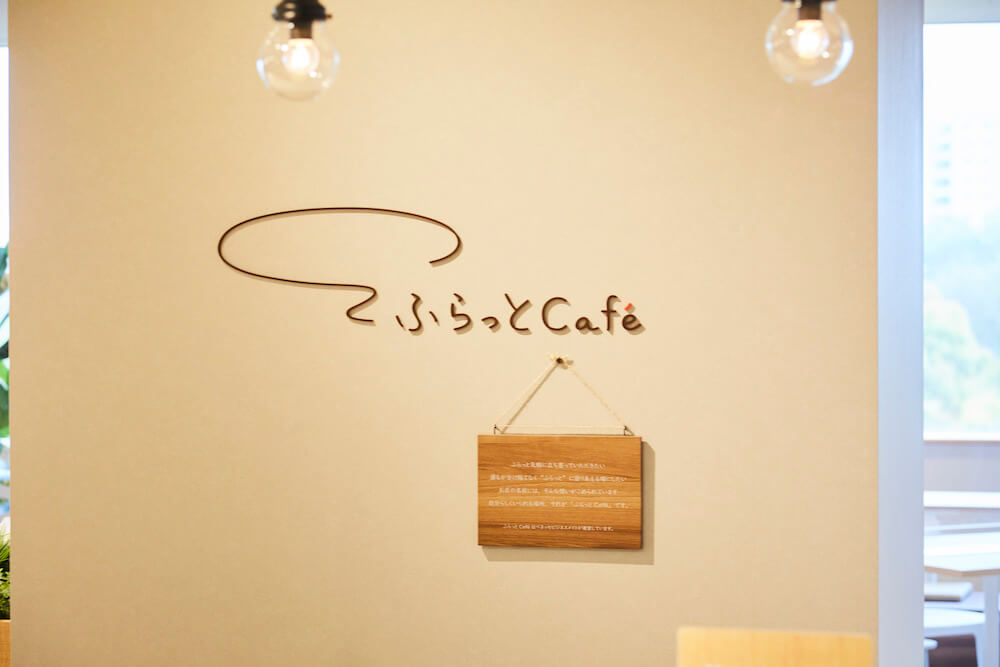
Okuhira: The corporate website of Benesse Business-mate discloses initiatives and know-how relating to its employment of people with disabilities under the tab heading TAMATEBAKO (external link).
Mr. Chatani: Yes, that’s right. We have received many inquiries about site tours from companies, schools and facilities that support the employment of people with disabilities. By sharing what we have tried, we hope to contribute to increasing the level of employment of people with disabilities across Japan and increasing the amount of places where more and more people can play active roles. We disclose everything, including our failures, on the TAMATEBAKO page. There are no trade secrets (laughs).
Okuhira: Many companies are worrying about how to prevent the turnover of people with disabilities. They would find the site very helpful.
Mr. Chatani: We will continue to disclose our own cases and know-how freely to grow the community of friends who will nurture the future of employment of people with disabilities.
Okuhira: That sounds so hopeful! Thank you very much for your time today.
Photo: Eizaburo Sogo



